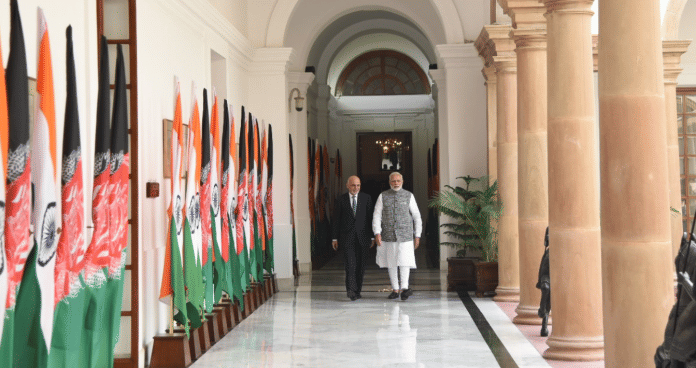There is increased pressure on India, particularly from the US, to do more in Afghanistan. First, it was President Donald Trump’s policy speech on South Asia that underlined New Delhi’s central role in helping the war-torn country. This was followed by visits to India by the US secretaries for Defence and State, with Afghanistan figuring prominently in talks between the two sides. Separately, Afghan President Ashraf Ghani and Prime Minister Narendra Modi held talks in New Delhi this week. So far, the focus of India’s assistance in Afghanistan has largely been on developmental aid and training.
What more can India do in Afghanistan without inviting Pakistan’s wrath? We ask experts.
For all the talk of change in Washington, President Trump’s Afghanistan policy is nothing new
 Timothy Roemer
Timothy Roemer
Former U.S. Ambassador to India
There are unique and close historical ties between India and Afghanistan. The cultural, ethnic and religious connections go back centuries and lend trust and stability to this relationship.
For all the talk of change in Washington, President Trump’s Afghanistan policy is nothing new. In fact, it’s largely an endorsement and continuation of the Obama Administration and what I experienced and executed as U.S. Ambassador to India. This rare moment of clarity in U.S. foreign policy can allow India to expand its positive influence into Afghanistan without creating additional uncertainty from Pakistan. We recognise the need for additional investment that the Afghanistan people desperately need and continue to request.
India’s investment in economic growth, women’s empowerment programs, and infrastructure investment can be continued and should be expanded. We’ve seen President Trump himself endorse this in a speech this summer. There are opportunities to strengthen the bilateral relationship and reinforce the region through joint police training, law enforcement activities, and limited military sales (helicopters). All of this should be done with full transparency so as not to upset the balance in the region and the stability of Pakistan.
In the long term, it is within the vested interests of all parties – the United States, India, Afghanistan, Pakistan and the region – to encourage coordination, cooperation and shared investment between countries. Expanded investment from India to Afghanistan is a perfect opportunity to take a step forward to improved relationships and greater regional peace and international stability.
Afghan forces are fighting with their hands tied, and India must help untie them
 Manvendra Singh
Manvendra Singh
BJP MLA in Rajasthan and Editor-in-Chief of Defence & Security Alert
Afghanistan has the unfortunate distinction of being the country longest affected by cross terrorism, with the highest number of victims, and all of it sourced from Pakistan. It is one of the enduring modern myths, accepted hook-line-and sinker, that Pakistan began the anti-Soviet jehad after the 1979 invasion of Afghanistan. Sold as a service to the free world, nothing could be further from the truth. For in fact the training, arming and funding of anti-Kabul militants began in 1975 as a Pak-Saudi exercise of faith. The CIA joined the party later.
Given that Pakistan’s obsession with a foothold in Afghanistan goes back to the 1970s, and no matter what policy India was to follow with Kabul, there would still be deep animosity. A severe reaction is to be expected. If India was involved solely in horticultural activities in Afghanistan, GHQ Rawalpindi would still go ballistic. Retribution is always to be expected, even if India only exports roses to Afghanistan.
So, it is better to go the whole way, and enhance the combat capabilities of the Afghan Army, Air Force, and any other service that increases security of the common people. India has forgotten that Iran and Afghanistan were its neighbours until 14 Aug 1947. That relationship should never be belittled. Training is not enough when India should in fact be sharing military hardware, including tanks, combat helicopters and aircraft. Afghan forces are fighting with their hands tied, and India must help untie them. Timidity in security policy never pays.
There is no change in what the US says it wants India to do in Afghanistan, except in tone
 Barnett Rubin
Barnett Rubin
Senior Fellow and Associate Director, Center for International Cooperation, New York University
I have no idea what the US expects India to do in Afghanistan. The Obama and Bush administrations both supported Indian involvement in Afghanistan, especially in economic development. As far as I know, there is no change. The only change is in tone. When the previous administrations supported Indian involvement in Afghanistan, they would often add that such involvement did not constitute any threat to Pakistan. In his speech on the new strategy, however, Trump linked Indian involvement in Afghanistan to pressure on Pakistan. I would say that such statements encourage Pakistan to view Indian efforts in Afghanistan as threats, except that the Pakistan security establishment does not seem to need any encouragement to entertain such misconceptions. Nonetheless, it is not helpful.
I hope that the U.S. will encourage both India and China to aid Afghanistan and to cooperate in doing so, despite their differences on other matters. That would send a strong message to everyone in the region that the entire international community is united in favor of assisting the Afghan state to achieve peace, eliminate terrorism, and stabilize the country.
Any major foray in security assistance or a security role in Afghanistan could be counter-productive
 Arun K. Singh
Arun K. Singh
Former ambassador to the United States
When the Taliban fled Kabul on 13 November 2001, India quickly re-established its diplomatic presence in Afghanistan, and examined how best it could contribute to stabilization in the post- Taliban Afghanistan.
A conscious decision was then taken to focus on economic assistance and capacity building — severely needed in a country devastated by more than 20 years of conflict, displacement of population, destruction of infrastructure and disruption of governance and economic activity. Reviving the economy would facilitate return of refugees and contribute to increased security. It was the least controversial role India could play, since no one could legitimately cite any security concerns from enhanced economic assistance. Such support would also enable India to gain goodwill among the Afghan government and people.
The $2 billion of assistance so far provided by India has contributed to transportation and energy infrastructure, hydroelectric and irrigation projects, rebuilding of schools and hospitals, midday meals for back-to-school programs, community development projects, training of personnel, scholarships for youth. It has been assessed to be among the most effective of assistance programs. Today, India is seen as an empathetic friend by the Afghan people.
Based on its competitive advantage and experience gained, India should look at doing more of such assistance.
Drawing down of international presence has caused economic contraction. Any major foray in security assistance or a security role could be counter-productive. Landlocked Afghanistan is not easy to access for providing security support. Pakistan would ratchet up its support to Taliban and Haqqani network citing India’s presence. Others would be inclined to view it as an India-Pakistan issue rather than Afghanistan’s valid quest for sovereignty and independence. US and NATO/ ISAF provision of security complicates their relationship with Pakistan as it continues to interfere in Afghanistan. This is to India’s advantage.
New Delhi won’t seriously entertain boots-on-the-ground option, and the White House doesn’t expect it to
 Michael Kugelman
Michael Kugelman
Deputy director, Asia Program, The Wilson Center
India should take better advantage of the India-Afghanistan strategic partnership accord. Concluded in 2011, it involves ample economic, trade, and political cooperation and is profoundly non-controversial.
For instance, India could increase investments in Afghanistan’s critical yet struggling telecommunications sector. Until relatively recently, the telecom industry was Afghanistan’s chief source of private employment. With the Afghan economy suffering since the withdrawal of most foreign troops in 2014, infusions of Indian capital into such a high-potential industry could prove game changing.
This isn’t to say India’s role in Afghanistan should be completely non-security in nature.
Make no mistake: The boots-on-the-ground option is completely off the table, as it should be. New Delhi won’t seriously entertain such an option, and the White House doesn’t expect it to. However, the 2011 strategic partnership calls for India to train Afghan security forces. Wisely, this program was recently expanded to the police.
Another option is arms sales. Afghanistan makes no secret of its desire for Indian military materiel. There’s a precedent. Not too long ago, India transferred several Russian-made fighter helicopters to Afghanistan.
This isn’t to say India and Afghanistan should develop a flourishing arms trade. Still, several one-off shipments of air weaponry could help address Afghanistan’s air power needs—one of the Afghan military’s greatest incapacities.
True, any Indian role in Afghanistan is bad for Pakistan. Even seemingly innocuous collaborations could be perceived as nefarious. Still, big increases in non-security cooperation coupled with small increases in security cooperation should keep Pakistani ire at manageable levels.
India has a unique positioning and special skills to help Afghanistan in many ways
 Alyssa Ayres
Alyssa Ayres
Sr Fellow for India/Pakistan/South Asia, The Council on Foreign Relations, and Former State deputy assistant secretary for South Asia.
As the fifth-largest bilateral donor to Afghanistan over well more than a decade, India has quietly demonstrated its cost-effective development partner approach. Infrastructure development—the Afghan parliament building, the Salma Dam, segments of the Ring Road, electrical lines—has been at the forefront of India’s assistance approach. But so have some lesser-known efforts, such as training of civil servants, or partnering with business associations to provide vocational skills training (like plumbing and welding).
All of these efforts can help create economic strength in a country that badly needs it, and which will have to keep working to develop livelihoods opportunities for its own stabilization.
I’ve argued for more than two years (see my policy innovation memo on why the United States should work more with India to help Afghanistan) that India’s unique positioning and special skills can be helpful to Afghanistan in many ways. The strong ties between members of the Afghan government and the Indian government could be a point of trust—and given the challenges with Afghanistan’s fragile democracy, India could provide technical advice and support on democracy to shore up the power-sharing configuration in Kabul.
India could continue to be a helpful voice on regional economic integration, for India’s enormous market will be a crucial export market for Afghan goods with better connectivity. (I realize Pakistan is the hold up on this question.) Finally, India could also be a helpful partner on civilian security issues, such as on counter-IED (improvised explosive device) training, or on support functions like literacy training for the Afghan security forces.







The US expects India to provide greater investments in Afghanistan and other assistance, as mentioned in the article. Uncle Sam also wants Indian co-operation in the Far East against unjustified Chinese policies. The US should help India with state-of -the art defensive and offensive military capabilities , so India can stand up to both China and terrorism from Pakistan.
In reality, the US does not do it, as it thinks it may get less co-operation from Pakistan in Afghan matters. Not only that, but Uncle Sam provides Pakistan with billions in military and financial aid. It does not stand up to China’s rogue
trade policies. And it is creating difficulties for India’s IT related and other exports. So Uncle Sam must review its policies towards India for greater mutual co-operation.